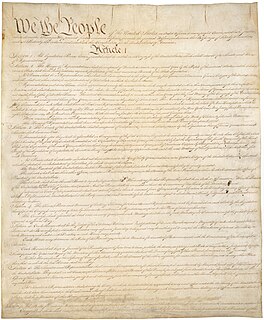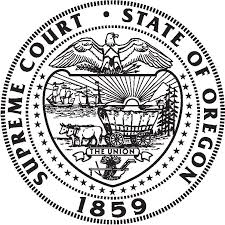| Measure 19 | |||||||||||||
|---|---|---|---|---|---|---|---|---|---|---|---|---|---|
| No Free Speech Protection for Obscenity, Child Pornography. | |||||||||||||
| |||||||||||||
| |||||||||||||
| Source: Oregon Blue Book [1] | |||||||||||||
Ballot Measure 19 was a citizen's initiative in the U.S. state of Oregon in 1994. The measure sought to amend the Oregon Constitution, limiting free speech protection for obscenity and child pornography. The measure was rejected by the voters 54.3 percent to 45.7 percent. [1]

In political science, an initiative is a means by which a petition signed by a certain minimum number of registered voters can force a public vote in parliament called an indirect initiative or via a direct initiative, the latter then being dubbed a Popular initiated Referendum.

In the United States, a state is a constituent political entity, of which there are currently 50. Bound together in a political union, each state holds governmental jurisdiction over a separate and defined geographic territory and shares its sovereignty with the federal government. Due to this shared sovereignty, Americans are citizens both of the federal republic and of the state in which they reside. State citizenship and residency are flexible, and no government approval is required to move between states, except for persons restricted by certain types of court orders. Four states use the term commonwealth rather than state in their full official names.

Oregon is a state in the Pacific Northwest region on the West Coast of the United States. The Columbia River delineates much of Oregon's northern boundary with Washington, while the Snake River delineates much of its eastern boundary with Idaho. The parallel 42° north delineates the southern boundary with California and Nevada. Oregon is one of only three states of the contiguous United States to have a coastline on the Pacific Ocean.
The measure was sponsored by the Oregon Citizens Alliance, the sponsor of Oregon Ballot Measure 9 (also a constitutional amendment), which among other things sought to prevent all governments in Oregon from using their resources to promote, encourage or facilitate homosexuality.
The Oregon Citizens Alliance (OCA) was a conservative Christian political activist organization, founded by Lon Mabon in the U.S. state of Oregon. It was founded in 1986 as a vehicle to challenge then–U.S. Senator Bob Packwood in the Republican primaries, and was involved in Oregon politics from the late 1980s into the 1990s.
Homosexuality is romantic attraction, sexual attraction or sexual behavior between members of the same sex or gender. As a sexual orientation, homosexuality is "an enduring pattern of emotional, romantic, and/or sexual attractions" to people of the same sex. It "also refers to a person's sense of identity based on those attractions, related behaviors, and membership in a community of others who share those attractions."
The text of the measure read as follows:
Article 1, Section 8 of this Constitution shall not be interpreted to prevent the people, the Legislative Assembly, or any City or County from enacting laws regulating or prohibiting obscenity, to the extent permitted by the United States Constitution. For purposes of this section, the term "obscenity" shall have the meaning given it by the United States Supreme Court, and in addition shall also include child pornography. [2]
The United States Constitution is the supreme law of the United States. The Constitution, originally comprising seven articles, delineates the national frame of government. Its first three articles embody the doctrine of the separation of powers, whereby the federal government is divided into three branches: the legislative, consisting of the bicameral Congress ; the executive, consisting of the President ; and the judicial, consisting of the Supreme Court and other federal courts. Articles Four, Five and Six embody concepts of federalism, describing the rights and responsibilities of state governments, the states in relationship to the federal government, and the shared process of constitutional amendment. Article Seven establishes the procedure subsequently used by the thirteen States to ratify it. It is regarded as the oldest written and codified national constitution in force.
Opposing the measure were a coalition of groups that made up the "No Censorship - No On 19" Committee, led by the American Civil Liberties Union. Other groups included bookstores, video stores and student groups.

The American Civil Liberties Union (ACLU) is a nonprofit organization whose stated mission is "to defend and preserve the individual rights and liberties guaranteed to every person in this country by the Constitution and laws of the United States." Officially nonpartisan, the organization has been supported and criticized by liberal and conservative organizations alike. The ACLU works through litigation and lobbying and it has over 1,200,000 members and an annual budget of over $100 million. Local affiliates of the ACLU are active in almost all 50 states, the District of Columbia, and Puerto Rico. The ACLU provides legal assistance in cases when it considers civil liberties to be at risk. Legal support from the ACLU can take the form of direct legal representation or preparation of amicus curiae briefs expressing legal arguments when another law firm is already providing representation.
The OCA also sponsored Measure 13 in the same year. [3]






